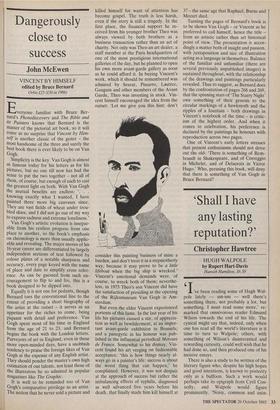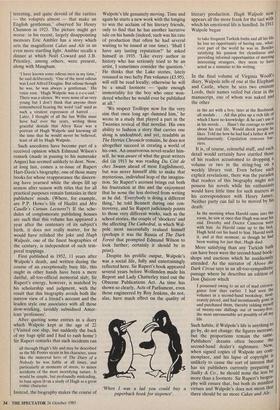`Shall I have any lasting reputation?'
Christopher Hawtree
HUGH WALPOLE by Rupert Hart-Davis
Hamish Hamilton, f6.50
'ye been reading some of Hugh Wal- pole lately — urn-um — well there's something there, not probably a lot, but something. I must read some more,' re- marked that omnivorous reader Edmund Wilson towards the end of his life. The cynical might say that, indeed, only when one has read all the world's literature is it time to turn to Walpole; others, with something of Wilson's disinterested and rewarding curiosity, could well wish that he had done so, and then produced one of his incisive essays.
There is also a study to be written of the literary figure who, despite his high hopes and good intentions, is known to posterity only as a buffoon. Such a work would perhaps take its epigraph from Cyril Con- nolly, and Walpole would figure prominently. 'Noisy, common and unin-
teresting, and quite devoid of the rarities — the voluptes almost — that make an English gentleman,' observed Sir Henry Channon in 1923. The picture might get worse: in his recent, largely disappointing memoirs Eric Ambler has a story which sets the magnificent Cakes and Ale in an even more startling light. Ambler recalls a dinner at which Noel Coward and J.B. Priestley, among others, were present, along with Maugham.
have known some odious men in my time,' he said deliberately. 'One of the most odious was Lord Alfred Douglas. But odious though he was, he was always a gentleman.' His voice rose. 'Hugh Walpole was a c-c-c-cad.' There was a silence. We were none of us very young but I don't think that anyone there remembered hearing the word 'cad' used as such a virulent expression of hatred . . . Later, I thought of all the fun Willie must have had over the years, writing those graceful denials that Alroy Kear was a portrait of Hugh Walpole and knowing all the time that he would never be believed, least of all by Hugh Walpole.
Such anecdotes have become part of a received opinion which Edmund Wilson's remark (made in passing to his namesake Angus) has seemed unlikely to dent. Now, at long last, comes a re-issue of Rupert Hart-Davis's biography, one of those many books for whose reappearance the discern- ing have yearned while the shops fill up season after season with titles that for all practical purposes remain fantasies in their publishers' minds. (Where, for example, are P.P. Howe's life of Hazlitt and Mrs Caudle's Curtain Lectures?) If the sche- dules of conglomorate publishing houses are such that this volume has appeared a year after the centenary of its subject's birth, it does not really matter, for he would have relished the joke and Hugh Walpole, one of the finest biographies of the century, is independent of such tem- poral trappings.
First published in 1952, 11 years after Walpole's death, and written during the course of an exceptionally busy life, this might in other hands have been a mere dutiful, all-too-official memorial slab; Sir Rupert's energy, however, is matched by his scholarship and judgment, with the result that this biography avoids both the narrow view of a friend's account and the leaden style one associates with all those slow-working, lavishly subsidised Amer- ican 'professors'.
After quoting some entries in a diary which Walpole kept at the age of 22 (`Visited one ship, but suddenly the back of my bags split and I had to rush home') Sir Rupert remarks that such incidents ran
all through Hugh's life and may be described as the Mr Pooter strain in his character, since like the immortal hero of The Diary of a Nobody he was liable at all times, and particularly at moments of stress, to minor accidents of the most mortifying nature. It would be simple, but profoundly misleading, to base upon them a study of Hugh as a great comic character.
Instead, the biography makes the course of Walpole's life genuinely moving. Time and again he starts a new work with the longing to win the acclaim of his literary friends, only to find that he has another lucrative tale on his hands (indeed, such was his rate of production that often he had several waiting to be issued at one time). 'Shall I have any lasting reputation?' he asked himself in 1935. 'Like every author in history who has seriously tried to be an artist, I sometimes consider the question.' He thinks that the Lake stories, lately reissued in two hefty Pan volumes 43.95), will still be read locally; otherwise he will be a small footnote — 'quite enough immortality for the boy who once won- dered whether he would ever be published at all.'
'We respect Trollope now for the very sins that once long ago damned him,' he wrote in a study that played a part in the Twenties revival of that novelist. His own ability to fashion a story that carries one along is undoubted; and yet, readable as The Herries Chronicle remains, he does not altogether succeed in creating a world of his own. An omnivorous novel-reader him- self, he was aware of what the great writers did (in 1913 he was reading Du Cate de chez Swann ahead of most Englishmen), but was never himself able to make that mysterious, individual leap of the imagina- tion. Sir Rupert's account brings out both his frustration at this and the enjoyment that he none, the less derived from writing as he did. 'Everybody is doing a different thing,' he told Bennett during one con- troversy, and Sir Rupert judiciously points to those very different works, such as the school stories, the couple of 'shockers' and the affecting The Cathedral, in which Wal- pole most successfully realised himself (perhaps it was the Russia of The Dark Forest that prompted Edmund Wilson to look further; certainly it should be in print).
Despite his prolific output, Walpole's was a social life, fully and entertainingly reflected here. Sir Rupert's book appeared several years before Wolfenden made his Report and Lady Chatterley tried out the Obscene Publications Act. As time has shown so clearly, Acts of Parliament, even those engineered by Roy Jenkins, do not, alas, have much effect on the quality of 'When I was a lad you could buy a paperback book for sixpence'. literary production. Hugh Walpole now appears all the more frank for the tact with which his emotional life is handled. In 1911 Walpole began
to take frequent Turkish baths and all his life he lost no opportunity of having one, what- ever part of the world he was in. Besides satisfying his passion for cleanliness and providing informal opportunities of meeting interesting strangers, they seem to have acted as a stimulus to his writing.
In the final volume of Virginia Woolf's diary, Walpole tells of one at the Elephant and Castle, where he sees two eminent Lords, their names veiled but clear in the manuscript, one of whom was naked and the other
in the act with a boy; later at the Beefsteak all medals . . . All this piles up a rich life of which I have no knowledge: & he can't use it in his novels . . . Hasn't the courage to write about his real life. Would shock people he likes. Told me how he had had a father & son simultaneously. Copulation removes bar- riers.
It is, of course, colourful stuff, and such detail would certainly have startled those of his readers accustomed to dropping a volume or two in the string-bag on a weekly library visit. Even before such explicit revelations, there was the paradox that readers of this biography might not possess his novels while his enthusiasts would have little time for such matters as his correspondence with Henry James. Neither party can fail to be moved by his death:
In the morning when Harold came into the room, he saw at once that Hugh was near his end. Dorothy and Doctor Cameron were with him. As Harold came up to the bed, Hugh held out his hand to him. Harold took it, and at that moment, as though he had been waiting for just that, Hugh died.
More satisfying than any Turkish bath can have been were the second-hand book- shops and auctions which he assiduously attended. As the narrator of Above the Dark Circus says in an all-too-sympathetic passage where he describes an edition of Don Quixote which I possessed owing to an act of mad extrava- gance four days earlier. I had seen the volumes in a second-hand bookshop, mod- erately priced, and had incontinently gone in and purchased them, thereby ridding myself of twenty-one shillings out of twenty-five, the most unreasonable act possibly of all MY life.
Such habits, if Walpole's life is anything to go by, do not change: the figures increase, but the proportions remain the same- Publishers' dreams often become the second-hand dealer's nightmare. Now, when signed copies of Walpole are com- monplace, and his lapse of copyright is unlikely to cause the sort of interest that has six publishers currently preparing a Stalky & Co., he should none the less be more than a footnote. Sir Rupert's biogra- phy will ensure that, but both its manifest virtues and Walpole's does not mean that there should be no more Cakes and Ale.



























































 Previous page
Previous page